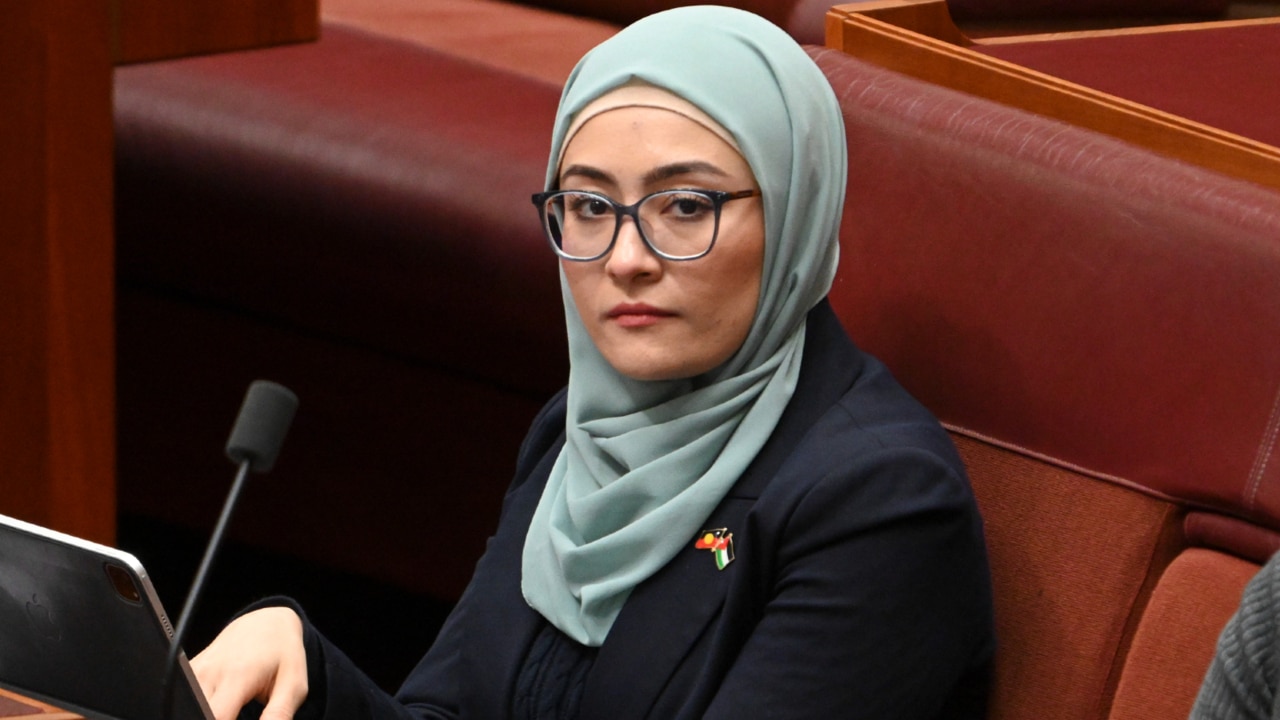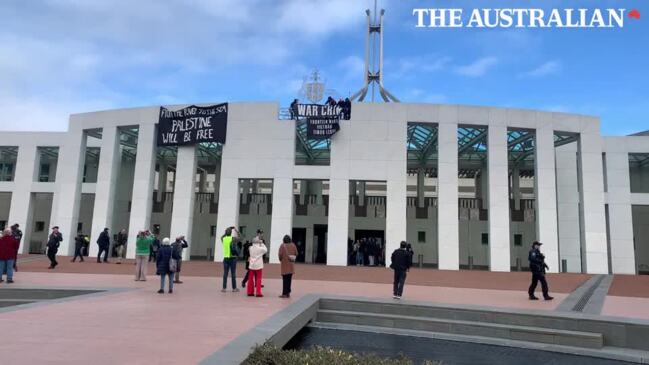Fatima Payman’s threat of Muslim movement has Labor on the run
Anthony Albanese and Peter Dutton face a momentous decision in coming months as Fatima Payman threatens to establish a tightly targeted, faith-based Islamic political party. Can the Labor and Liberal leader work together to halt this threat to the two-party system in Austraia?

As governments around the world fall victim to the fracturing of the body politic, the splitting of traditional major parties, the growth of minor, sectional parties and an explosion of independents, Australia’s two main parties – already facing long-term erosion of their traditional support – now risk the emergence of yet another splinter group that could guarantee no majority government.
The spectacular and the highly orchestrated resignation of rogue West Australian senator Fatima Payman from the ALP on Thursday, while hinting at the formation of a new political party aimed at seats with high Muslim populations, immediately put Labor ministers on a war footing.
Having already suffered years of lost votes and support to the broad Greens movement in affluent inner-city seats, Labor could now face a new threat of a tightly targeted, faith-based Islamic movement in its traditional strongholds in outer working-class suburbs in Sydney and Melbourne.

There are at least six Labor-held seats, four in the western suburbs of Sydney and two or three in the suburbs of Melbourne, with Muslim populations of up to 30 per cent which could be vulnerable to a highly focused pro-Palestinian campaign, despite having large margins from the last election.
A split in ALP voters with a move to a Muslim party candidate combined with the preferences of Greens and Liberal voters could enable an independent to leap frog Sydney Labor MPs Jason Clare, Education Minister, in Blaxland; Tony Burke, Workplace Relations Minister, in Watson; Chris Bowen, Climate Change and Energy Minister, in McMahon; and Ed Husic, Industry Minister, in Chifley.
In Melbourne, the seat most at risk from a preference flow defeat is Wills, the seat of senior Labor backbencher Peter Khalil, but Ged Kearney’s seat of Cooper would also be at risk.
A loss of six seats would put Labor out of government and bloat the independents and minor party numbers to such an extent there would have to be a post-election negotiation for minority government. Either a Labor minority government or, less likely, a Coalition minority government would be chained to a large group of independents.
The political paradigm of major party dominance has changed in the past three decades as the Greens have grown at Labor’s expense, Pauline Hanson’s One Nation Party steadfastly drains the Coalition vote and, spectacularly at the last election, the Simon Holmes a Court-backed Climate 200 teal independents grabbed six seats from the Liberals in the blue heartlands of Sydney, Melbourne and Perth.
As the Prime Minister made clear in parliament on Wednesday that Payman – following a month-long strategy – was going to resign from the ALP but remain in the Senate, the senator confirmed this at a press conference on Thursday and Labor began to mobilise in preparation for yet another minor party that could split its vote.
There was real anger within Labor about Payman’s resignation after she supported the Greens on the recognition of Palestine, publicly backed pro-Palestinian protesters and accused her colleagues of intimidating and isolating her.
Although not all the anger was directed at the junior senator, with some senior figures complaining the Labor leadership of Albanese and Foreign Minister Penny Wong had drifted on the whole issue of Palestine and Israel after the Hamas terror attacks on October 7 and the Israeli military response in Gaza – and this had allowed polarised views to become entrenched and social division to grow.
The dramatic invasion of the front roof of Parliament House in Canberra on Thursday by pro-Palestinian protesters after months of attacks and blockades of MPs’ electorate offices – including Albanese’s own office in Marrickville, which has been unused for six months – demonstrated the ongoing divisions and damage to Albanese’s authority.

But the threat of an organised party campaigning in select electorates with advice on how to harvest preferences is the real danger to Labor, with the possibility of not only losing seats to new independents but also dropping below a national primary vote of 30 per cent.
As a senator, Payman could fast-track the creation and formal registration of a new party because her signature can be used instead of 1500 verifiable signatures, which can take months to organise, so she represents a clear and present danger to Labor.
The raising of her dual citizenship and the prospect of a High Court constitutional challenge to her eligibility to even remain in the Senate is evidence of the extent of Labor concern.
It is here, though, that a commonality of interests for the major parties can provide some protection for Albanese as well as the Opposition Leader.
The key to any new pro-Palestinian party’s success against Labor is whether the Liberals decide in selected seats to put Labor last on how-to-vote cards on election day. Senior strategists on both sides believe a Liberal decision to put a pro-Palestinian party last – in keeping with everything Dutton has said about social division, pro-Palestinian desecration of war memorials, anti-Semitism and damages to MPs’ offices – would be obvious.
Of course, any Liberal decision to put Labor ahead of a pro-Palestinian party – one Inquirer believes will be implemented – would allow for a quid pro quo on Greens preferences in selected seats. At the last election, Labor preferences handed victory to the Greens over the Coalition in the Queensland seats of Brisbane, Griffith and Ryan.
During the growing pro-Palestinian and anti-Semitic protests, Albanese has ratcheted up his attack on the Greens – including describing the motion in the Senate recognising Palestine on which Payman fatefully crossed the floor as a stunt – and has faced growing calls to agree to put the Greens last on how-to-vote cards.
While it is a relatively easy matter for Dutton to put a pro-Palestinian candidate last in a safe Labor seat it is much more difficult for Albanese to put a blanket ban on Greens preferences because there are more than 10 ALP seats delivered on Greens preferences.
But, in the interests of both major parties, and there are working precedents for on-the-ground co-operation on polling day, it could be that they would harvest preferences from each other just as the minor parties and independents have done for decades.
Although there are stark policy differences between Labor and the Coalition – particularly in this election on nuclear power – it is possible that Payman’s new existential threat to Labor in its heartland could trigger a broader major party co-operation which could save Labor seats, limit Greens gains and help the Liberals recapture lost seats.
It could be a realignment in which the major parties recognise that putting their main opponent above independent or minor party candidates on how-to-vote cards to guide preferences could be in their mutual interest. Even in the national interest in the sense of being able to guarantee a workable majority government at a time when the public is tired of polarised politics and the obsession with power that places sectional and special interests above the general interest and division.
Of course, Albanese and Dutton will be intent on vigorously competing with each other in the five-week winter parliamentary break which begins this weekend, promoting their own policies and addressing voters’ top concern of cost-of-living pressure.
Albanese, who refused an invitation to attend a NATO meeting in Washington to avoid being seen to be travelling overseas and neglecting key domestic issues, is determined to sell his government’s tax cuts, energy rebate, housing assistance and wage rises as relief for families that won’t put pressure on inflation.
Dutton, who ironically baited Albanese for his refusal to travel to the US, also wants to get back to talking about bread-and-butter issues after a hectic three-week period in which he said he would not sign up to Labor’s 2030 unachievable 43 per cent carbon reduction target and committed to a nuclear power policy with seven nuclear sites around Australia.
Although Dutton had been gaining on Albanese in the polls in recent months, lifting the Coalition primary vote, raising his satisfaction levels with voters and, crucially, closing in on Albanese to the narrowest margin he’s had since he became Liberal leader, the last Newspoll survey published on Monday showed a drop.
In what appeared to be voter disillusion as the leaders shifted focus to climate change, carbon emissions reductions, renewable energy and nuclear power away from economic issues, both parties suffered a fall in support while the Greens and independents rose.
For Labor, July 1 – Monday – was going to be the launch pad for this renewed focus on domestic issues, billions in tax cuts, energy rebates and housing schemes, but Payman has put paid to that and made the chances of an “early election” in September far less likely.
It is now more likely that Albanese will focus on rebuilding his support, fighting prices, possibly freshening his team, ensuring there isn’t a new threat in western Sydney and, as he’s always indicated, holding an election next year.







Anthony Albanese and Peter Dutton, as the leaders of the Labor and Liberal parties, face a momentous decision in coming months that could determine not only their political fates at the next election but also the ability of Australian governments to govern effectively in the national interest.